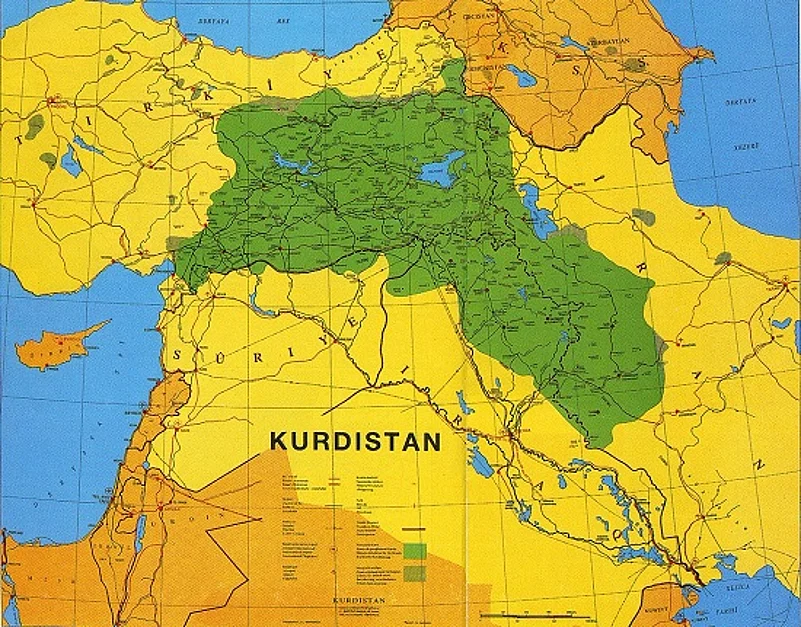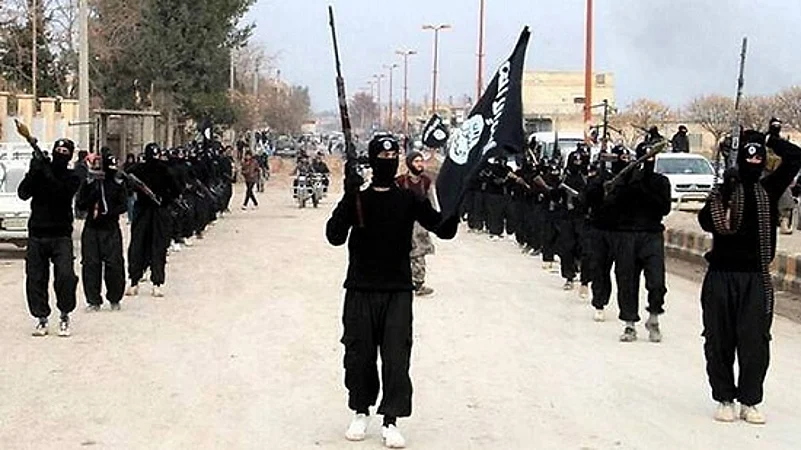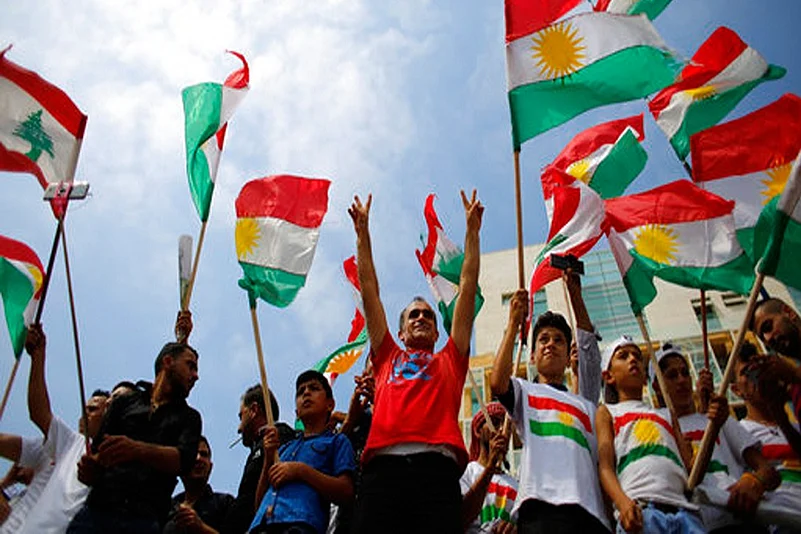On 25 September, the Kurds of Iraq voted overwhelmingly to secede from Iraq and set up themselves up as an independent state. This referendum had been announced in July by Masoud Barzani, the president of the Kurdistan Regional Government (KRG). Over the last two months, the Iraqi government headed by Prime Minister Haidar al Abadi, made every effort to persuade Barzani to cancel the vote and discuss federal and other issues with Baghdad.
Last-ditch efforts to postpone the vote were made by all parties: Turkey and Iran closed their borders to the land-locked region. The US state department issued two statements, one on 15 September and the other five days later: the latter said that the US “strongly opposes” the referendum and called for a “serious and sustained dialogue” with the central government.
Advertisement
Barzani ignored all these warnings and gleefully announced on 27 September that, in a 72 percent turnout, 92 percent of the voters had opted for freedom.
Kurdish feuds
The Kurds number about 30 million in the four countries of Turkey, Syria, Iraq and Iran, and are perhaps the world’s largest ethnic group without a state of their own. There is also well-documented evidence of sustained neglect of their political, economic and cultural interests and aspirations in all the states where they live as minorities.
The Gulf War of 1991 led to the setting up of an Kurdistan Regional Government (KRG) in the largely Kurdish territories in Iraq. This status was affirmed constitutionally after the US invasion of 2003. With its capital in Arbil, the KRG enjoys a high degree of autonomy.
Advertisement

Despite their unique ethnic and cultural identity, the Kurds have hardly ever in their history been a cohesive political and military force. Through the 20th century, Kurdish affairs have been dominated by two powerful families, the Barzani and the Talabani, who today maintain separate fiefdoms centred around Arbil and Sulaimaniya, respectively, through their political parties, Barzani’s Kurdish Democratic Party (KDP) and Talabani’s Patriotic Union of Kurdistan (PUK).
More seriously, the stranglehold of these two families over Kurdish affairs over so many decades has retarded the political growth of the region: Barzani’s two terms as president ended two years ago, after which he suspended the assembly and has governed with no scrutiny of his actions. Kurdish youth have been repeatedly frustrated by Barzani’s authoritarian and non-transparent rule, with suspicions of widespread corruption, particularly relating to the oil
revenues.
Hence, the dissident view before the referendum was that this was not a vote for freedom but rather “a mandate for the perpetuation of the autocratic, predatory governance by both the KDP and PUK”.
Disputed areas
Barzani’s motives for pushing the referendum in the face of so much opposition has led to considerable speculation among commentators. The dominant view is that, with the Iraqi government and armed forces distracted by the war against ISIS at Mosul and other fronts, Barzani thought of using the referendum to bolster his sagging popularity among the Kurds, grab as much of disputed territory as possible and thus re-affirm his authoritarian rule in the
region.
Advertisement

The disputed areas are Kirkuk, Sinjar, Makhmour and Khanaqin, which have a mixed ethnic population, but which the KRG has been claiming as part of its domain. These areas as mentioned as disputed in the Iraqi constitution, whose final status is to be decided through referendum. With successive governments concerned with serious domestic political and military conflicts, this matter has placed on the back-burner.
The most coveted jewel for the Kurdish crown is, of course, Kirkuk, which has 40 percent of Iraq’s oil reserves and the country’s richest agricultural land, both of which would be crucial for an economically viable Kurdistan. Kirkuk has a complicated demographic narrative, having had a dominant Turcoman population for several centuries. The city now has a mixed Turcoman, Arab and Kurd population, all of them vying for leadership and control amidst rising ethnic tensions.
Advertisement
Responses to the vote
The “yes” vote for secession and independence has inaugurated a period of grave uncertainty as the participating players sharpen their positions for the next act. As a first step, Iraqi prime minister Haidar al Abadi affirmed his commitment to Iraq’s unity, described the referendum as “unconstitutional”, and refused to hold talks on the vote with the KRG.
Turkish president Recep Tayyip Erdogan has said that the independence move could ignite an “ethnic war” in the region and threatened to cut the pipeline that carries KRG oil across the Turkish border to markets in Turkey and Europe.
Advertisement

He added that all options, including military, were under consideration, and commenced joint military exercises with Iraqi forces.
In Iran, jubilant Kurds celebrated the vote through large demonstrations, while the government kept the border closed and conducted military manoeuvres at the border. Israel is the only country in the region that has backed Kurdish aspirations for freedom. This reflects Israel’s long-standing ties with the dissident Kurds in Iraq and its interest to back any initiative that would promote instability and uncertainty for Iraq and Iran. But, beyond this, Israel’s support has little value on the ground.
Prospects for Kurdistan
Given the opposition from the central government and the neighbours, the outlook for independent Kurdistan is grim. KRG territories are landlocked, with the area getting 92 percent of its needs from its neighbours. It main source of income is from oil exports of about 650,000 barrels per day, but its sole pipeline passes through Turkey, which is also the major buyer of its oil.
Advertisement
The KRG is dependent on contributions from the federal budget, which generously provides 17 percent of the central revenues to the KRG. With hostile ties with the central government and the neighbours, the KRG will hardly seem an attractive destination for international aid and investment. In fact, neighbours could impose economic sanctions on the KRG in the shape of trade blockade and freezing of credit, which will exacerbate the economic situation in the beleaguered territory and even precipitate a severe humanitarian crisis.

The disputed areas are 48 percent of the Kurdish territory and have a population of 2.7 million. While the KRG will seek to use its military forces to forcibly assert domination over these multi-ethnic lands, its control will almost certainly be questioned: there are already reports that the largely Shia, Iran-influenced Popular Mobilisation Units (PMU), are speeding up the mopping up operations against the ISIS, after the capture of Mosul, and are likely to challenge Kurdish control over Kirkuk, setting the stage for a bloody confrontation.
Advertisement
Overall, most regional commentators are bewildered by the vote, believing the KRG already enjoys near-total independence, with its own parliament, government, army, and security services, besides full control over its oil revenues and customs duties at its border crossings. So far, the Iraqi federal order has accommodated both the Barzani and Talabani factions, with senior positions provided to Kurds in the national government. As Barzani gains in stature after the vote, the Talabani group will oppose his domination and assert their own economic and political interests in the KRG, setting the stage for sharp internecine disputes.
Regional security
West Asia, which is already experiencing two military conflicts in Syria and Yemen and ongoing anti-ISIS operations in both Iraq and Syria, is likely to see new war fronts emerge. The war on ISIS has helped put together coalitions that include Iraq, Iran, Turkey, the US and Russia. As this war is coming to an end, the coalitions are unravelling, with regional constituents now gearing up to assert geopolitical claims that had till now been kept in abeyance.
Advertisement

Both Iran and Turkey, with large restive Kurd populations of their own, can now be expected to cooperate to neutralise the urge for freedom emerging from Arbil. The distinguished Arab writer, Abdel Bari Atwan, has warned of an “ethnic war” in which the fate of the Kurdish state will be no different from that of the “Islamic State”, particularly since the coalition ranged against it is the same as the one that has just vanquished ISIS.
The role of the US and Israel in this imbroglio is more uncertain. While the US has made strong statements against the referendum, some Arab commentators say that Barzani could not have persisted with the referendum without tacit US support. A writer in Egypt’s Al Ahram describes the US as the “true ruler” in the KRG, and believes that it would like to maintain a “permanent and guaranteed military presence inside Kurdistan”, which would
give it an attractive base to watch and manipulate events in Iran.
Advertisement
Another emerging area of contention will be Syria, where the US-sponsored Syrian Democratic Forces (SDF), mainly Kurdish, with some token Arabs and Turcoman fighters, are poised to set up their Rojava, western homeland, along the Turkish border. Turkey has made known its opposition to this development. Its troops have already entered Syria to bifurcate the Kurdish homeland and show no signs of withdrawal. Turkey has also now detached
itself from the anti-Assad coalition led by Saudi Arabia and joined the Russia-led peace process, backed by Iran, that seeks to keep Assad in place in Damascus.
The Kurds seem to believe that US (and Israeli) backing will help to realise their aspirations for statehood in both Iraq and Syria. But, determined opposition from Iran and Turkey will reveal how limited and ineffectual this support is on the ground. The writer in Al Ahram sees Kurdish dreams soon turning into a nightmare, which, he thinks could provoke the Kurds to overthrow their authoritarian and corrupt leaders.
Advertisement
(The author, a former diplomat, holds the Ram Sathe Chair for International Studies, Symbiosis International University, Pune.)




















